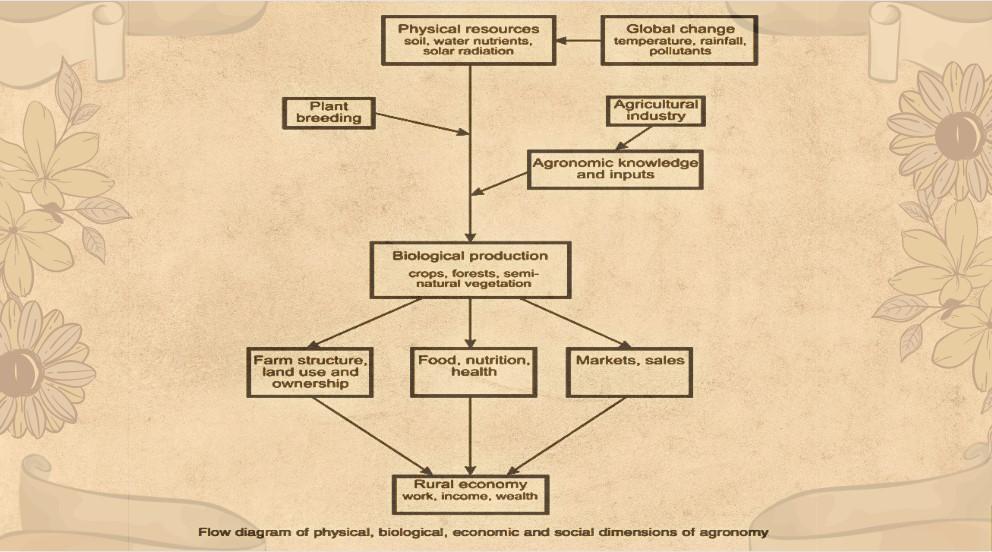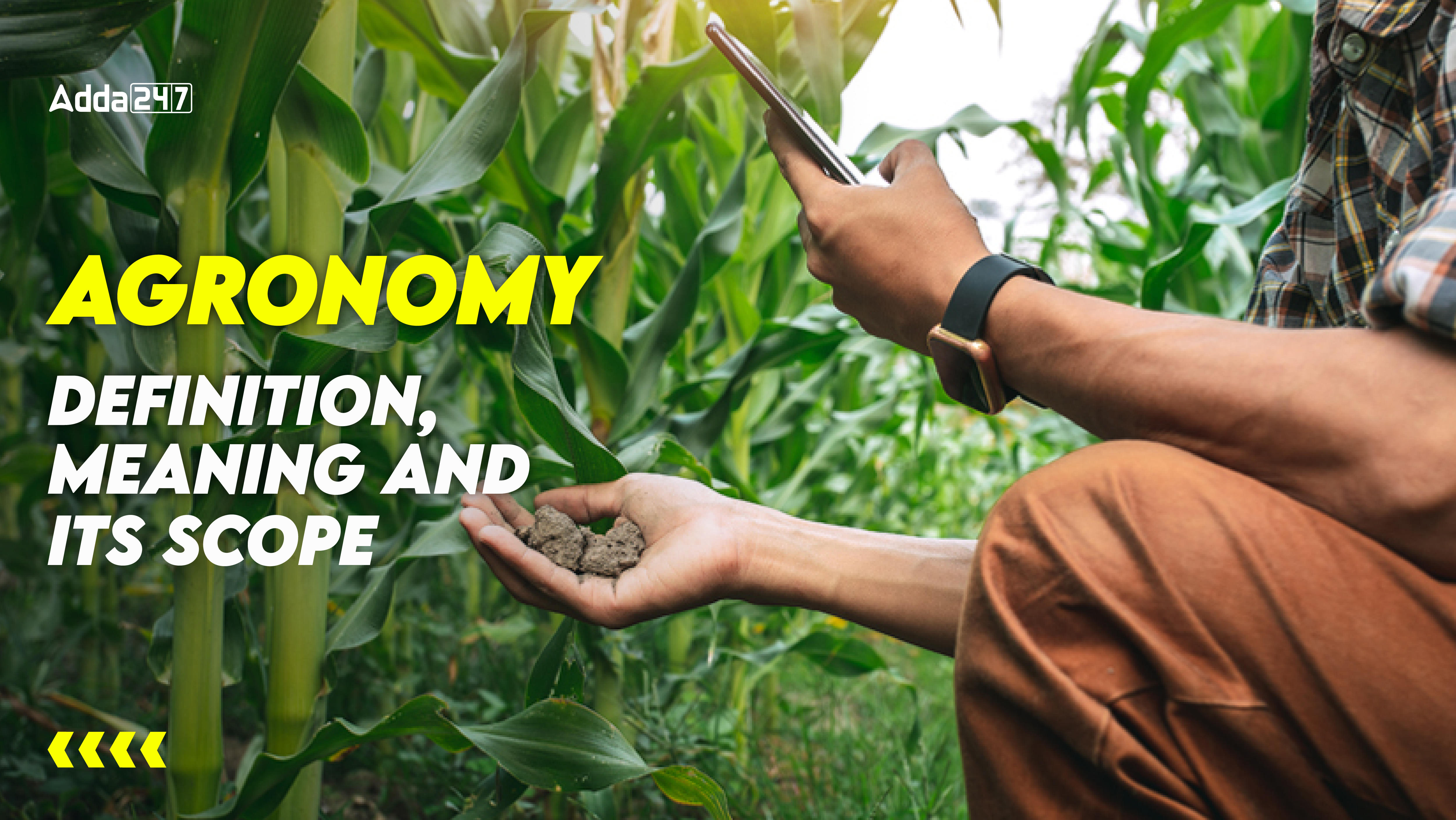Table of Contents
Agronomy is the branch of agriculture that deals with crop production and management. Agriculture is derived from the Latin terms ‘ager or agri‘ which means ‘soil’ and ‘culture’ which means ‘cultivation’. Both science and art are found in agriculture making it very vast. Norman (1980) has defined agronomy as the science of manipulating the crop environment complex with the dual aim of improving agricultural productivity and gaining a degree of understanding of the process involved.
Agronomy is an agricultural science that studies crop principles and practices. In this guide, you will find all the information related to agronomy.
What is Agronomy?
Agronomy is derived from two Greek words in which ”Agros” means field and ”Nomos” means management. Pietro de’Crescenzi is the father of agronomy. Agronomy has three branches namely,
- Crop Science,
- Soil Science, and
- Environmental Science deals only with applied aspects (i.e.,) Soil-Crop-Environmental relationships.
Agronomy takes into account the entire spectrum of factors that affect crop productivity such as soil, water and its availability, crop genetics, climate and adaptation, nutrients needed by the crop, crop growth and development processes, and the most effective methods for managing weeds.
Agronomy is an art, science, and business.
- As an art, agronomy refers to the knowledge of the way to perform the operations of the farm skillfully but does not necessarily include an understanding of the principles underlying farm practices. Both physical and mental skills are essential for successful crop production.
- Agronomy is a science because scientific principles are freely used for the production of quality crops
- Agronomy is a business because small and marginal farmers take crop production on subsistence levels but progressive and large farmers consider it to maximize production as well as profit.
Agronomic practices are also influenced by non-biological factors such as financial constraints, consumer and farmer behavior, and environmental issues. The scientific study of agronomy focuses on how to profitably and efficiently grow crops while preserving natural resources and safeguarding the ecosystem.
Agronomy Boundaries
Agronomy encompasses many elements like physical, biological, and economic factors all related to Crop management, and its scientific study. Agronomy encompasses a wide range of disciplines including ecology, entomology, climatology, soil plant, and weed sciences, and requires cooperation and integration of these fields. Since scientific research is the foundation of effective crop production techniques these techniques are inherently dynamic and always improving.

Agronomy Scope
Agronomy is an ever-changing field. It becomes essential in the following agricultural practices
- Improved knowledge and comprehension of plants and surroundings leading to the modification or creation of new agricultural practices aimed at achieving maximum productivity.
- The availability of herbicides to suppress weeds resulted in the accumulation of extensive knowledge regarding the method and selectivity of herbicide application.
- The purpose of building massive irrigation projects is to supply irrigation facilities. But along with appropriate water management techniques.
- Aiming to grow more crops on the same piece of land to balance out the growing population. Intense cropping has consequently gained popularity.
- The rise in energy costs has also led to a shift away from clean cultivation and toward tillage methods. Similarly to fully realize their potential new technologies must be developed.
- To combat the factors affecting agricultural production like limited soil fertility, crop varieties with low genetic yield, poor agronomic practices, insufficient disease, and insect control, unavailability of production inputs, government economic policies affecting agriculture, and insufficient research and extension programs.
Agronomy relation to other sciences
Agronomy is a synthesis of several disciplines like soil science, Agricultural chemistry, crop physiology, plant ecology, biochemistry, and economics. Soil physical, chemical, and biological properties have to be understood thoroughly to effect modification of the soil environment. Similarly, it is necessary to understand the physiology of crops to meet their requirements. Advances in economic analysis helped in the production of crops economically.
The Soil Science- It helps the agronomist to thoroughly understand the soil’s physical, chemical, and biological properties to effect modification of the soil environment.
Agricultural Chemistry- It helps the agronomist to understand the chemical composition and changes involved in the production, protection, and use of crops and livestock.
Crop physiology- It helps to understand the basic life process of crops to understand the functioning of each part of the plant to determine their input requirement like nutrients etc.
Plant ecology- It helps us to understand the associated environment in which the crops grown like the influence of weather (Temperature, Rainfall, etc.).
Biochemistry- It shows how the biochemical process takes place in crops which helps to understand critical requirements to favorably activate this process.
Who is an Agronomist?
An agronomist is a Scientist who studies the principles and practices of crop production and soil management for the production of food for human beings and feed for his animals.
Role of Agronomist
Agronomist studies the problems of crop production and develop better ways of producing food, feed, and fiber, and also aim to obtain maximum production at minimum cost. Some more roles are discussed below.
- Agronomists shoulder the responsibilities of all social, economic, and cultural problems in addition to field problems for the effective functioning of the farm in general.
- Agronomist exploits the knowledge developed by basic and allied, applied sciences for higher crop production.
- Agronomist researches scientific cultivation of crops taking into account the effect of factors like soil, climate, and crop varieties and adjust production techniques suitably depending on the situation.
- The agronomist co-operates and coordinates with all the disciplines of agriculture to develop efficient methods of cultivation, and to identify various types of nutrients required by crops.
- Agronomists must select a better weed management practice.
- Crop planning (i.e.,) developing crop sequence should be developed by agronomists and also developing the method of harvesting, time for harvesting, etc.


 CCI Answer Key 2024 Out, Check Questions...
CCI Answer Key 2024 Out, Check Questions...
 FSSAI Assistant Notification 2024, Check...
FSSAI Assistant Notification 2024, Check...
 CCI Exam Analysis 2024, Check Section-wi...
CCI Exam Analysis 2024, Check Section-wi...


 Adda247 Job portal has complete information about all Sarkari Jobs and Naukri Alerts, its latest recruitment notifications, from all state and national level jobs and their updates.
Adda247 Job portal has complete information about all Sarkari Jobs and Naukri Alerts, its latest recruitment notifications, from all state and national level jobs and their updates.